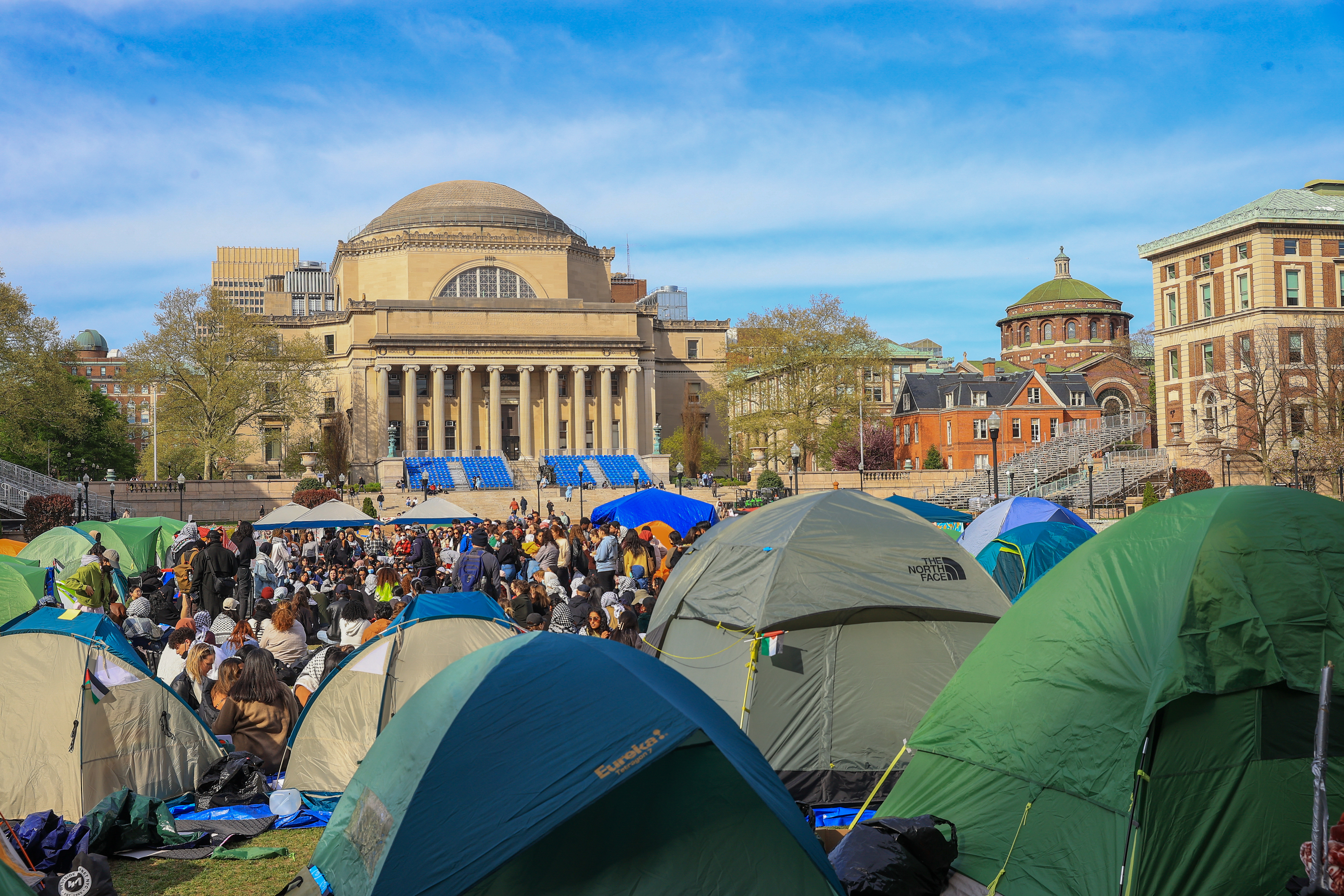As tri-state residents are advised to stay inside as much as possible to slow the spread of COVID-19, there is increasing worry that social distancing and the new restrictions will further endanger survivors of domestic violence who may be co-sheltering with their abuser.
Experts have sounded the alarm that the stress and strains of the coronavirus pandemic could lead to more frequent or intense incidents of domestic violence.
That is the case in the state of New York. According to Gov. Andrew Cuomo's top aide Melissa DeRosa, the New York State Police has seen an uptick in reported domestic violence cases.
“I spoke to the state police this morning there is a reported uptick,” she said during Cuomo’s daily coronavirus press briefing on Friday. “Some reports are as high as 15 to 20 percent. It’s unacceptable on any day. I want people to know that every single case that is reported, the state police is going to investigate fully.”
DeRosa reminded the public to call the New York state's domestic violence hotline at 1-800-942-6906 or, if one needs immediate help, 911.
During a Tuesday Twitter Live Q&A session, NYPD Commissioner Dermot Shea said police have not seen an uptick in 911 calls related to domestic violence following the home-bound order, although “domestic crime still happens.”
Shea admitted there’s no way of knowing for sure whether domestic violence survivors are hesitating to call 911 to report abuse at the home, however, it is likely that incidents are not being reported. He also mentioned that the overall foot traffic of people reporting crimes in person at precincts has gone down significantly.
News
“Domestic violence victims, we are always concerned about,” he said. “I can say that crime has dropped off the face of the map really since social distancing went into effect.”
Shea went on to say: “What I’m concerned about is that it’s happening and it’s not getting reported on, and I think that’s a reality we should all face."
Each NYPD command has officers dedicated to making regular check-ins for domestic violence victims, Shea said. He’s asked them to make the rounds by contacting them via phone or email "just to make sure everything is OK.”
“Those high priority people we have to make sure that violence isn’t happening behind closed doors and doing our best in keeping people safe," he said.
While Shea mentioned that there have been no upticks in calls, the NYC HOPE website, which offers online resources to domestic violence victims and survivors, saw a spike of 95 visitors per day to the group’s website from March 18 and 30. During this time the website has also seen 354 "new visitors," an average of 27 per day. For comparison, before the outbreak, the website saw an average of 45 visits per day, and nine new visitors a day. The spike came after the city's Family Justice Centers, which offers confidential help to victims and survivors of domestic violence, temporarily closed since March 18 because of the virus.
While the centers are physically closed, they are still offering survivors assistance.
In a statement, Commissioner for the Mayor's Office to End Domestic Violence and Gender-Based Violence (ENDGBV) Cecile Noel said: “Survivors need us now more than ever in these extraordinary times, and our top priority remains to ensure continuity of services and unwavering support. Our Centers continue to provide crucial crisis support and advocacy by connecting survivors to immediate safety planning, shelter assistance, legal consultations, and more. COVID-19 puts into sharp focus the vulnerabilities that many people in our city face every day, especially gender-based violence survivors; and it highlights the barriers and challenges that we know keep people from seeking help and finding safety. The City is here for survivors during this crisis and beyond, and will continue to work to identify best practices and innovative approaches to enhance its services.”
The challenge of finding safety during this wide-spanning health crisis is echoed by the New Jersey Coalition to End Domestic Violence (NJCEDV).
"Avoiding public spaces and working remotely can help to reduce the spread of COVID-19, but for many survivors, staying home may not be the safest option. Abuse is about power and control. During times of crisis, and especially forced isolation, incidents of domestic violence often rise, and violence may escalate," according to the NJCEDV.
Meanwhile, in Connecticut, the City of Hartford and Internal House are reminding domestic abuse victims that there are resources available to them if they need help, NBCConnecticut.com reported.
“The coronavirus pandemic is affecting our community in many ways, and we are very concerned that the isolation of social distancing combined with economic harm and uncertainty could put victims of domestic violence at greater risk,” said Mayor Luke Bronin in a statement, NBCConnecticut.com reports. “We want all of our residents to know that support and intervention services like Interval House are fully available to them, and our Police Department is continuing to work hand in hand with domestic violence advocates."
WHERE TO FIND HELP
THE STATE OF NEW YORK
- Visit the State Office for the Prevention of Domestic Violence website
- Call the New York State Domestic and Sexual Violence Hotline at 1-800-942-6906 (English & español/Multi-language Accessibility)
- Individuals who are deaf or hard of hearing should dial 711
- For a listing of domestic violence hotlines by county, go to: https://www.nyscadv.org/find-help/program-directory.html
Additional Hotlines in New York State
- New York State Child Abuse Hotline: 1-800-342-3720
- New York State Adult Abuse Hotline: 1-800-342-3009, press option 6
- New York State Office for the Aging Helpline: 1-800-342-9871
- New York State Department of Health – Growing Up Healthy: 1-800-522-5006 TTY: 1-800-655-1789
Other New York State Resources
- New York State Office for the Prevention of Domestic Violence
- New York State Coalition Against Domestic Violence
- New York City Mayor’s Office to Combat Domestic Violence
- New York State Coalition Against Sexual Assault
Children-Related Resources
- New York State Office of Children and Family Services
- Prevention Information Resource Center/Parent Helpline: 1-800-244-5373
NEW YORK CITY
- In New York City, although ENDGBV Family Justice Centers (FJC) locations are temporarily closed, survivors can still reach the Centers directly Monday to Friday, 9 a.m. to 5 p.m. on the FJC phone lines (Brooklyn: 1-718-250-5113; Bronx: 1-718-508-1220; Manhattan: 1-212-602-2800; Queens: 1-718-575-4545; Staten Island: 1-718-697-4300.)
- ENDGBV is connecting survivors to its community based organizations (CBO) and partner agencies for vital services including immediate safety planning, shelter assistance, legal consultations, counseling sessions, case management sessions, and more.
- Domestic violence shelters are operating.
- For evenings and weekends, survivors can call NYC’s 24-hour Domestic Violence Hotline (1-800-621-4673), to access assistance with immediate safety planning, shelter assistance and community resources.
- Survivors with access to the internet can visit nyc.gov/NYCHOPE for additional resources and information.
- Survivors are additionally encouraged to call NYC Well (1-888-692-9355) for help with stress and anxiety, as well as to call 911 for emergencies.
NEW JERSEY
- If you would like to talk with an advocate, please call the New Jersey statewide hotline 24/7 at 1-800-572-7233 (SAFE).
- If you are unable to speak safely, you can log onto https://thehotline.org or text LOVEIS to 22522.
- If you are Deaf and need support, please call the National Deaf videophone at 1-855-812-1001, which is also available 24/7.
- Domestic violence organizations continue to provide services, however, some programming may be limited or offered remotely in order to ensure the safety of staff and clients.
Resources from NJCEDV
- Increasing Survivor Safety During COVID-19
- Deaf Advocacy Project (DAP) Vlog: Coronavirus Safety Plan
- Tips for Staying Healthy During the COVID-19 Crisis
- Updates from NJ Courts and Government Agencies
- Tips for Remote Counseling and Advocacy
- Wellness Tips During COVID- 19
- Facebook Live Discussion: Relationship De-Escalation During COVID-19
- Facebook Live Discussion: Safety Planning During COVID-19
CONNECTICUT
- Interval House has a 24/7 bilingual crisis hotline operated through CT Safe Connect. You can reach that hotline at 888-774-2900.
- Other resources include the National Domestic Violence Hotline available at 1-800-799-7233, by texting LOVEIS to 22522, or its online chat line available here.
- There is also an Anti-Violence Project hotline available for LGBTQ+ individuals at 212-714-114.



